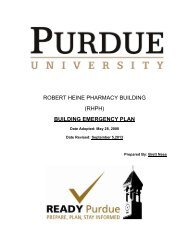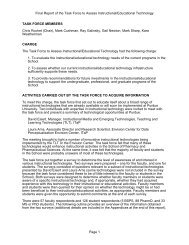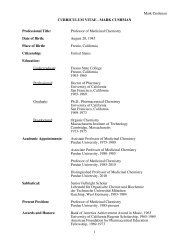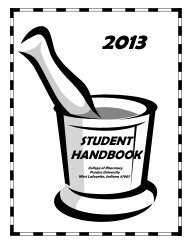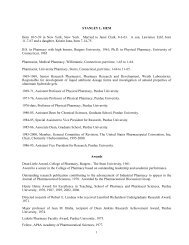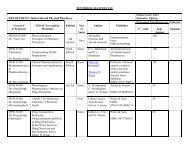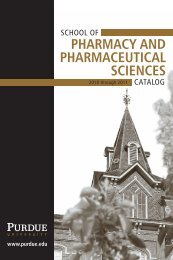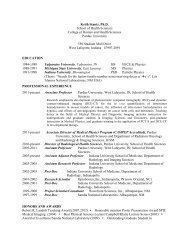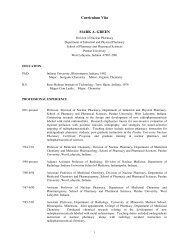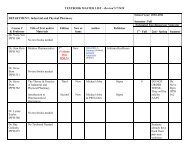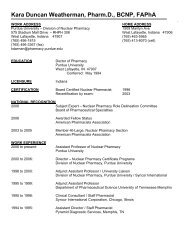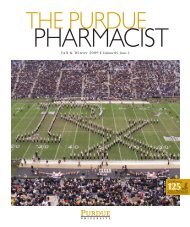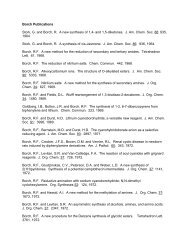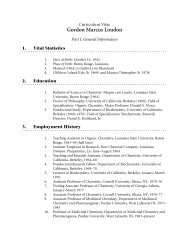Spring/Summer 2011 - Purdue College of Pharmacy - Purdue ...
Spring/Summer 2011 - Purdue College of Pharmacy - Purdue ...
Spring/Summer 2011 - Purdue College of Pharmacy - Purdue ...
Create successful ePaper yourself
Turn your PDF publications into a flip-book with our unique Google optimized e-Paper software.
instructor, a “group grade” to themselves and to other members<br />
<strong>of</strong> their group. Their group assignment grade is modified<br />
accordingly. This keeps “goldbrickers” from getting points<br />
on these assignments.<br />
We also started using both audio and video course<br />
recordings to provide students with the ability to replay classes.<br />
We weren’t the first to use course recordings; Mark Sharp<br />
[Director, Hook Telecommunications Center] and Dr. Eric Barker<br />
started doing audio course recordings with posted PowerPoint<br />
slides, but Mark and I were first to use a document camera and<br />
audio so that students could follow what I was both writing and<br />
saying simultaneously. This system has now spread throughout<br />
<strong>Purdue</strong> with the “Echo 360” system, by which students can<br />
download any class from a (free) iTunes site.<br />
Another innovation was to introduce online homework.<br />
Several online homework systems had been available for<br />
General Chemistry, but were uncommon for Organic Chemistry.<br />
Recently, systems have become available that allow students<br />
to draw structures and other chemistry-related notation online.<br />
At the urging <strong>of</strong> my co-instructor, Laurie Parker, we tried using<br />
a commercial online homework system (Sapling Learning) for<br />
organic chemistry.<br />
Finally, we have changed our organic chemistry laboratories<br />
from “cookbook”-style labs to “guided-design” labs. In these<br />
laboratories, students have to solve explicit laboratory problems.<br />
Our director <strong>of</strong> laboratories, Susan Holladay, and two very<br />
dedicated teaching assistants, Animesh Aditya and Jaimeen<br />
Majmudar, were instrumental in this activity, which is ongoing.<br />
Were these changes effective? If so, how?<br />
What is the response from the students?<br />
We use confidential end-<strong>of</strong>-class evaluations to solicit student<br />
responses, and we get about 90% response. I was encouraged<br />
by the fact that the students in my initial class <strong>of</strong> 40 in 1993<br />
significantly out-performed their peers in the subsequent<br />
Organic Chemistry II class (which I did not teach, and which<br />
was a large class).<br />
For the group work, it would be naïve to ask whether group<br />
or non-group sections do better, because different students<br />
have different learning styles. Rather, I chose to ask whether<br />
the students who judged their groups to be “functional and<br />
useful”—whatever that means to the students—could expect<br />
better grades. The students who said that their study groups<br />
are “highly functional and useful” fared on average about<br />
0.35–0.4 GPA better in the class than those who felt that their<br />
groups were “dysfunctional” or “not functional and not useful.”<br />
The size <strong>of</strong> the benefit parallels what is reported in other<br />
studies in engineering. The group rating did not correlate<br />
at all with General Chemistry grades, so this clearly is not a<br />
situation in which the best chemistry students continue to do<br />
better than others. About 60-70% <strong>of</strong> the students said that<br />
they had effective groups, and 21% said that they had “highly<br />
effective” groups. But, there are definitely students for whom<br />
the group process doesn’t work. One <strong>of</strong> the nice things<br />
sociologically about groups is that students learn to work<br />
with students they did not previously know, and they report<br />
that they have made new friends as a result. Evidently, we’ve<br />
even had a few marriages between students who first met in<br />
“O-Chem” groups!<br />
Our studies showed that about 50% <strong>of</strong> the students use<br />
the course recordings, and that there is no correlation with<br />
expected grade. However, students like these because they are<br />
a convenient way to catch up on a missed class. (Class attendance<br />
did not plummet when these recordings were introduced.) They<br />
also are useful to faculty, who can listen to themselves teach.<br />
The online homework showed an impressive correlation with<br />
expected (and actual) grade. Students who completed at least<br />
80% <strong>of</strong> the online homework made a 1.0 GPA better grade, on<br />
average, than those who did less <strong>of</strong> the homework, and this is<br />
after correction for the points awarded for the homework. We<br />
did not ask online homework questions explicitly on the exams.<br />
Students seem to prefer online homework to textbook problems<br />
because they get instant feedback from the system, and it makes<br />
them accountable for their answers. Our results appear to be the<br />
first ones reported for online homework in organic chemistry.<br />
Do you plan to continue incorporating these teaching methods<br />
in your classroom? If so, how do you think these changes in<br />
teaching and learning might impact the overall education <strong>of</strong><br />
pharmacy?<br />
We’ll use these and other improvements. I see on the horizon<br />
the “electronic learning resource”—a “textbook” in which<br />
source material, problems, homework, animations, and<br />
solutions are all part <strong>of</strong> a single electronic resource that students<br />
would be able to use on a computer or iPad. This is not the<br />
same as a simple electronic version <strong>of</strong> an ordinary book,<br />
such as a pdf. As obvious as this may sound, there are lots<br />
<strong>of</strong> problems with its effective implementation, but it’s coming.<br />
The Howard Hughes Medical Institute recently awarded a<br />
grant—the only one <strong>of</strong> its kind in the country—to <strong>Purdue</strong> and a<br />
consortium <strong>of</strong> three other universities. The grant funds a program<br />
called “NEXUS: National Experiment in Undergraduate<br />
Science Education,” and the goal <strong>of</strong> the program and its consortium<br />
is to completely rethink the basic science curriculum for<br />
pre-health pr<strong>of</strong>ession and pre-biology students with the goal <strong>of</strong><br />
providing a competency-based curriculum. <strong>Purdue</strong>’s part <strong>of</strong> this<br />
is to rethink the chemistry curriculum. I, Pr<strong>of</strong>s. Chris Hrycyna<br />
and Jean Chmielewski in Chemistry, and Pr<strong>of</strong>. David Sanders<br />
in Biological Sciences are the faculty involved, and already a<br />
new one-semester, biologically-relevant and rigorous General<br />
Chemistry course (CHM 109) has been designed and taught to<br />
our pre-pharmacy students. If this overall effort is successful,<br />
students will benefit from a streamlined but still rigorous<br />
chemistry curriculum that will prepare them well for their<br />
careers in the health pr<strong>of</strong>essions.<br />
You can read more about this topic in “<strong>Purdue</strong> helping students succeed in foundational<br />
classes,” University News Service, January 27, <strong>2011</strong>, www.purdue.edu/<br />
newsroom/general/<strong>2011</strong>/110127WhittakerFoundation.html and “Your Pr<strong>of</strong>essor,<br />
Your Computer, and You” (Brian Burnsed), U.S. News & World Report, January<br />
26, <strong>2011</strong>, www.usnews.com/education/online-education/articles/<strong>2011</strong>/01/26/<br />
your-pr<strong>of</strong>essor-your-computer-and-you_print.html.<br />
SPRING & SUMMER <strong>2011</strong> 15



